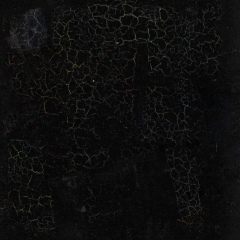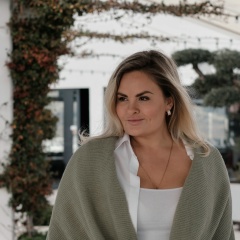О чем сегодня думается?... Мои дедушки - Иван Андреевич Комолов, фронтовик, связист, прошедший от синявинских и мгинских болот, через Ораниенбаумский плацдарм, нарвскую переправу до Эстонии, награжденный тремя медалями "За боевые заслуги" и одной "За отвагу", во сне до самой смерти ходил в рукопашную и страшно кричал. Почти ничего не рассказывал о войне. Ну, так... какие-то смешные эпизоды. Об остальном - только отдельные фразы. Как первыми взяли Ропшу и в результате страшной ошибки командования утром в тумане вступил в бой со своими же, потеряв много людей... Как страшно было под Нарвой... Как в январе 1944-го несколько дней туда-сюда переходили Гостилицкое шоссе и не могли перейти. Как сидели в соседних окопах с немецким "коллегой"-корректировщиком и не трогали друг-друга (потому что тогда противник тут же накроет и тебя по координатам своего), но уходя по приказу, каждый бросал в соседа гранату. И кто сделает это первым, тому и повезло... Мой второй дед - Александр Михайлович Румянцев - старшина зенитной батареи, до конца блокады был в Ленинграде, сначала в парке Александрино, потом у мясокомбината. Награжден лишь медалью "За оборону Ленинграда". Лишь. И тоже не рассказывал почти ничего. Про первые массированные налеты на аэродром Горелово, когда уже некуда было прятаться от бомб и он просто лежал на земле и смотрел в небо, на то, как бомбы отделяются от самолетов, и считал: если над головой - значит не моя. Если чуть впереди - закрывал глаза и ждал. Про батарейного пса, который слышал заранее приближение самолетов и четко различал наши и не наши. Про ленинградского мальчика, который ехал на велосипеде по улице и так с велосипедом и "пришпилился" к стене дома осколком неожиданного снаряда...
Мои бабушки Антонина Ивановна и Зинаида Артемьевна - блокадницы, и тоже пара-тройка незначительных рассказов от каждой. Все.
На даче в деревне Шалово, где я жила с детства, 15 человек не вернулась с войны., из них только шесть человек числятся погибшими, остальные - пропали без вести. Деревня была под немцами. И тоже никто из соседей ничего не рассказывал.
Ничего они не говорили о войне. Но откуда мы все это знаем? Почему все это жжет сердце.
Почему мы, женщины уже второго послевоенного поколения, не можем спокойно слушать "Прощание славянки"?
PS дедушка Саша сделал после войны из своего "смертника" игольницу. И я до сих пор держу в нем иголки
Мои бабушки Антонина Ивановна и Зинаида Артемьевна - блокадницы, и тоже пара-тройка незначительных рассказов от каждой. Все.
На даче в деревне Шалово, где я жила с детства, 15 человек не вернулась с войны., из них только шесть человек числятся погибшими, остальные - пропали без вести. Деревня была под немцами. И тоже никто из соседей ничего не рассказывал.
Ничего они не говорили о войне. Но откуда мы все это знаем? Почему все это жжет сердце.
Почему мы, женщины уже второго послевоенного поколения, не можем спокойно слушать "Прощание славянки"?
PS дедушка Саша сделал после войны из своего "смертника" игольницу. И я до сих пор держу в нем иголки
What are you thinking about today? ... My grandfathers are Ivan Andreevich Komolov, a front-line soldier, a signalman who passed from the Sinyavinsky and Mginsky swamps, through the Oranienbaum bridgehead, the Narva crossing to Estonia, awarded three medals "For Military Merit" and one "For Courage", in a dream, until his death, he went to hand-to-hand combat and screamed terribly. He said almost nothing about the war. Well, so ... some funny episodes. About the rest - only separate phrases. As the first to take Ropsha and as a result of a terrible mistake of command in the morning, in the fog, he went into battle with his own, having lost many people ... How scary it was near Narva ... As in January 1944, the Gostilitskoye Highway crossed here and there and didn’t could go. As we sat in neighboring trenches with a German “colleague” -refighter and did not touch each other (because then the enemy would immediately cover you in his own coordinates), but leaving on the order, everyone threw a grenade at a neighbor. And whoever makes it the first is lucky ... My second grandfather, Alexander Mikhailovich Rumyantsev, was the foreman of the anti-aircraft battery, until the end of the blockade he was in Leningrad, first in Alexandrino Park, then at the meat processing plant. He was awarded only the medal "For the Defense of Leningrad." Only. And also did not say almost anything. About the first massive raids on the Gorelovo airfield, when there was nowhere to hide from the bombs and he just lay on the ground and looked into the sky, at how the bombs were separated from the planes, and thought: if overhead, it means not mine. If a little ahead, he closed his eyes and waited. About the battery dog, who had heard in advance the approach of the aircraft and clearly distinguished ours and not ours. About the Leningrad boy who rode a bicycle along the street and so with a bicycle and “stuck” to the wall of the house with a fragment of an unexpected shell ...
My grandmothers Antonina Ivanovna and Zinaida Artemyevna are blockade women, and also a couple of minor stories from each. All.
At the dacha in the village of Shalovo, where I lived since childhood, 15 people did not return from the war., Of these, only six people are considered dead, the rest are missing. The village was under the Germans. And also none of the neighbors said anything.
They did not say anything about the war. But how do we all know that? Why does all this burn the heart.
Why can't we women of the second post-war generation calmly listen to “Farewell of the Slav”?
PS grandfather Sasha made a needle box from his "suicide bomber" after the war. And I still keep needles in it
My grandmothers Antonina Ivanovna and Zinaida Artemyevna are blockade women, and also a couple of minor stories from each. All.
At the dacha in the village of Shalovo, where I lived since childhood, 15 people did not return from the war., Of these, only six people are considered dead, the rest are missing. The village was under the Germans. And also none of the neighbors said anything.
They did not say anything about the war. But how do we all know that? Why does all this burn the heart.
Why can't we women of the second post-war generation calmly listen to “Farewell of the Slav”?
PS grandfather Sasha made a needle box from his "suicide bomber" after the war. And I still keep needles in it
У записи 21 лайков,
0 репостов,
315 просмотров.
0 репостов,
315 просмотров.
Эту запись оставил(а) на своей стене Ирина Комолова









































